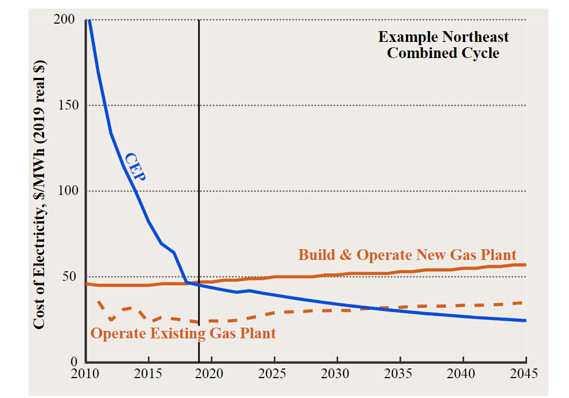 Getty Images/iStockphoto
Getty Images/iStockphoto There’s nothing so frantic as English majors writing about climate change, a problem at the intersection of science, law and economics. I take scientists’ word for much of it, but know something about climate economics and a painfully won degree’s worth of law.
So I’ll take on the latest panic of the climate left — that John Roberts’ Supreme Court will eviscerate climate-protection legislation once it is passed in 2021— and try soothing logic.
The basic reassuring rebuttal is: The court matters some, but prices matter much, much more, and the declining prices of renewable power and electric cars mean carbon emissions will begin to be solved in earnest in the next decade. No matter what courts do.
The fuss stems from a new report by liberal activist group Take Back the Court, arguing that the Roberts Court will do to the climate policy that Democratic presidential candidates promise what it almost did (but did not) to President Barack Obama’s Affordable Care Act. That is, declare it unconstitutional under readings of the law — especially the Constitution’s interstate commerce clause — that lawyers thought had been discredited in the 1930s.
“The Roberts Court has been increasingly emboldened to embrace radical theories for partisan reasons,” the report asserts. “In their challenge to [ACA], conservatives used arguments once considered beyond the pale… If Congress implements climate-change legislation, the Supreme Court could be expected to recycle this playbook.”
It won’t matter
Fair enough, aside from the rather large fact that Roberts himself stopped ACA from being overturned. But here’s another fair question: Will it matter?
To understand why not, begin with easy-to-digest numbers. The Paris Accords called for nations to reduce carbon emissions 20% by 2025 (from 2005 levels), get electricity production from renewable sources to 20% of the total, and increase building efficiency by 20%. The U.S. agreed to a 26% to 28% carbon reduction.
Other numbers you should understand tell us where carbon comes from in the U.S. About 93% of U.S. carbon emissions come from burning fossil fuels for energy. Mostly, this means making electricity and powering transportation.
To reduce carbon by 26%, or even 40%, you need a big reduction in electricity emissions and to begin cutting vehicle emissions. You don’t need much else. That’s beginning to happen now — without the Green New Deal or anything else the court can void.
The reason 20%-25% reductions are easy is that it’s now economically feasible to make nonsubsidized renewable electricity, and the inflection point is nearly here for cars. That’s why Democrats’ climate plans all now target bigger reductions than the Paris accords.
Reducing emissions now
Driven by plummeting costs of natural gas, and rapid declines for renewables (which will provide 18% of U.S. electricity this year, according to the Department of Energy), utilities have already cut carbon 27% since 2005, the Edison Electric Institute says.
Basically, the one-two of natural gas and renewables is wiping out coal, once 70% of U.S. electricity but running in the low 20s for parts of 2019. Even now, coal is about two-thirds of electricity-related carbon emissions. It’s that much dirtier than everything else.
Finishing off coal does the electricity piece of reducing carbon almost by itself. That’s before using policy to encourage utilities to retire gas-fired plants in favor of more renewables (which is coming, too).
But wiping out coal is baked in the cake.
Even once-coal-focused utilities like Southern Co. SO, +0.07% and Duke Energy DUK, -0.12% are committed to 50% carbon reductions by 2030. Leaders like Minneapolis-based Xcel Energy XEL, -0.03% will be at 80% by then — and expect to be carbon-neutral by 2050. They’ll be out of the coal business.
The best part is that this isn’t happening because of regulatory fiat — it’s happening because renewable power is now cheaper, with costs still falling.
That’s the conclusion of another new report, from the Rocky Mountain Institute, a think tank in Snowmass, Colo. (My nephew works there; he didn’t write this report).
 Rocky Mountain Institute
Rocky Mountain Institute Building natural gas plants now is wasteful, author Chaz Teplin writes. Renewables are cheaper to build and operate now than it is to build and operate a gas plant, Teplin says. Better, in 15 years it will be cheaper to build and operate a renewables plant than simply to keep operating a natural gas plant built today. With numbers like those, the prospects for many more gas plants entering the pipeline is poor.
Electric vehicles
The transportation piece is slightly harder, but reducing emissions 25% boils down to winning acceptance of electric cars. That requires tax changes — extending the tax credit for buying renewable cars and perhaps boosting it to $10,000 from $7,500, as South Bend Mayor (and Democratic presidential candidate) Pete Buttigieg proposes.
It could also mean a tax on carbon, either a higher federal gasoline tax or otherwise. (The feds began charging gas taxes in 1932 — they’re constitutionally safe).
The economic point is to raise the price of driving gasoline-powered cars while cutting the cost of driving electric vehicles powered by wind or solar. Once EVs are cheaper — which will happen irrespective of taxes within a decade, according to Bloomberg New Energy Finance, but faster with tax incentives — people will ditch gas guzzlers.
The legal point is that neither policy limits interstate commerce — they’re taxes, just like the tax on people who don’t buy health insurance that Justice Roberts upheld. So even the legal arguments aren’t really that scary, not if the ACA case is precedent.
If vehicles reach cost parity in the next few years and utilities just keep doing what they’re doing, mop-up operations on smaller greenhouse-gas sources can wait. Constitutional issues lie mostly outside the two big carbon-emission problems. Activists can tut-tut you about taking planes or eating beef if they’re left for later (or never), but the solution will be underway.
It’s easy to get rattled by President Donald Trump’s act, but free men and free markets aren’t so imbecilic.





